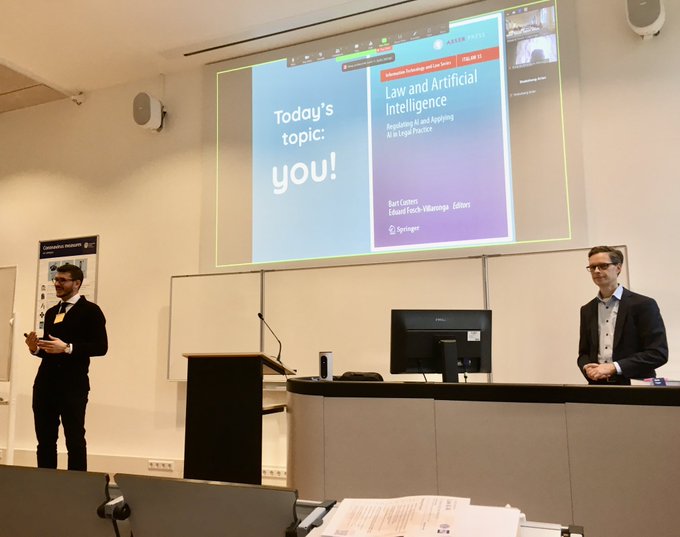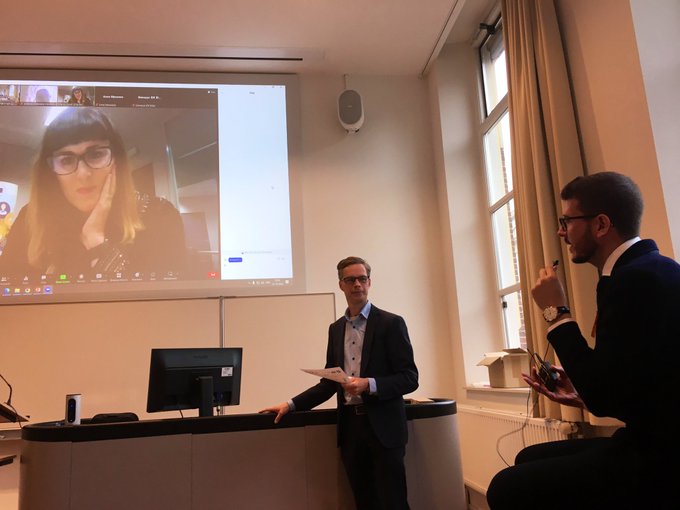Previous SAILS Symposia
On this page you can find information on past events, either organized or funded by SAILS.
Past Symposia 2023
28 June, SAILS x CAIRElab: Demystifying AI in Healthcare

In this symposium we went beyond the hype to explore the real impact of Artificial Intelligence (AI) in healthcare.
The programme and speakers:
14.00 hrs. Introduction to CAIRELab and SAILS
- Joost Batenburg (Leiden University) – SAILS programme director
- Marieke van Buchem (LUMC) – Co-lead CAIRELab
14.15 hrs. Opening session: Results of the 2023 AI monitor in hospitals
- M&I partners
14.35 hrs. Promoting responsible AI through ethical reflection @ LUMC – Key elements and some examples
- André Krom (LUMC) – Senior lecturer/ researcher, Department of Medical ethics and Health law
14.55 hrs. AI in LUMC's clinical practice
- Automating medical note taking using large language models
- Martijn Bauer (LUMC) – Internist
- Liza King (Autoscriber) – NLP Lead
- Automated segmentation and treatment plan generation for radiation therapy
- Frank Dankers (LUMC) – Medical Physicist
- Nienke Hoekstra (LUMC) – Radiation Oncologist
15.35 hrs. Break
16.05 hrs. From research to clinical practice: Text mining for health knowledge discovery
- Suzan Verberne (Leiden University) – Lead of the Text Mining & Retrieval group
16.25 hrs. Reverse pitches: healthcare professionals about the challenges they face
16.45 hrs. Closing session
- Jeroen van Rooden (LUMC) – CIO
17.00 hrs. Drinks
23 June: AI & Society - The Future of AI is Here (and Guess What … it’s Human)

The half-day conference The Future of AI is Here (and Guess What … it’s Human) brought together policy makers, researchers from Leiden university and international scholars to discuss the sense and nonsense of the current AI craze. People were invited to come and reflect with on which past events brought us here, what AI is already able to do and how it might very well unfold soon, with ample attention for possible prospective scenarios that have so far received less attention.
The symposium was organised by SAILS and took place at Leiden University’s The Hague Campus, Wijnhaven Building.
The programme and speakers:
Chair of the day: Joost Batenburg
13:15 – 13:25: Welcome and introduction by Hester Bijl, Rector Magnificus Leiden University
13:25 – 14:00: Keynote lecture by Virginia Dignum, Professor at Umeå University, title: Beyond the AI hype: Balancing Innovation and Social Responsibility, short abstract
14:00 – 14:45: ‘(How) can we keep up with ChatGPT and its siblings?’ – Panel about Large Language Models with Joost Broekens and Francien Dechesne, Leiden University, and Eva Hofman, journalist Groene Amsterdammer.
Moderator: Anne Meuwese, Leiden University
Q&A and Coffee Break
15:10 – 15:55: Keynote lecture by Holger Hoos, Professor of Machine Learning at Leiden University and initiator CLAIRE. Title: The Importance of Being Earnest: The Future of “AI made in Europe”
15:55 – 16:40: Panel about Digital Diversity and other possible AI Futures with Eduard Fosch, Rodrigo Ochigame, Oumaima Hajri and Yasmin Ismail, Leiden University. Moderator: Bart Barendregt, Leiden University
Q&A and Coffee Break
16:50 – 17:05: Closing statement by Kathleen Ferrier, UNESCO
17:05 – 17:15: Closing by Bram Klievink, Leiden University
We will end the afternoon with Networking and Drinks
More information about the event can be found at aiandsociety.nl
Showcasing AI Research @ Humanities
This SAILS event was in collaboration with Digital Humanities and aimed to bring bring participants up to speed on current AI-related research at the Faculty of Humanities. Scholars from the fields of history, journalism, philosophy, arts and linguistics presented their research, which either relies on AI as a powerful research instrument or studies.
Programme
| 14:00 | coffee/tea |
| 14:10 |
Defining Responsible AI in Journalism: Reporters’ Perceptions of Automated Decision-Making and Algorithmic Bias |
| 14:35 |
Historical Research in the Age of AI, or: Should Historians Become Data Scientists? |
| 15:05 |
[short talk] Looking Behind Closed Doors: Understanding 17th-Century Domestic Life with AI |
| 15:20 |
[short talk] Bridging the sign language technology gap: pitfalls, prerequisites and opportunities |
| 15:35 |
coffee/tea break |
| 15:55 |
[short talk] AI and Digital Humanities |
| 16:00 |
[short talk] Tracing the History of Technocracy in Historical Parliamentary Debates |
|
16:15 |
[short talk] Setting up Forensic Text Analysis Willemijn Heeren (University Lecturer), Meike de Boer (PhD candidate @ Leiden University Centre for Linguistics) |
| 16:30 | Pragmatics for Explainable AI Daniel Kostić (Postdoctoral researcher Human AI @ Institute for Philosophy) |
| 16:55 | Replacing Irreplaceability: Algorithmic Profiling, AI, and the Fear of Fragmentation Ilios Willemars (University Lecturer @ Leiden University Centre for the Arts in Society) |
| 17:20 | Closing questions/remarks |
Presentation slides of Replacing Irreplacibility by Ilios Willemars
Click hereSymposia in 2022
Second SAILS Conference on Law and AI, October 21 2022
On October 21, 2022, the the second SAILS Conference on Law and AI was held at the eLaw - Center for Law and Digital Technologies at Leiden University.
This year the conference was dedicated to the book launch of the book: Law and Artificial Intelligence: Regulating AI and Applying it in Legal Practice edited by Prof. Bart Custers and Dr. Eduard Fosch-Villaronga from the eLaw Center for Law and Digital Technologies at Leiden University.
-

Bart Custers and Eduard Fosch-Villaronga -

8th Wearables in Practice Symposium, October 14, 2022
How can AI shape future wearables for population dynamics? This question made the underlying theme of the 8th Wearables in Practice Symposium, which took place on the 14th of October in Leiden. The Wearables in Practice Community frequently organizes symposia to bring together professionals who work with wearables to discuss their findings and experiences.
The symposium was co-organised by the Leiden Institute of Advanced Computer Science (LIACS) and the Leiden University Medical Center (LUMC). This was the first time that the symposium was hosted in Leiden. The symposium was sponsored by SAILS and the Young Academy Leiden (YAL).
The program consisted of 7 invited speeches by researchers who contributed to AI for population health within a diverse range of application domains (e.g., psychology, epidemiology, drug research, and sports). These speeches included two keynote speeches by Dr Scott Small from the University of Oxford on reproducible machine learning for analysing wearables data in large-scale epidemiological health research and Prof. dr. Douwe Atsma from LUMC on redesigning health care using the wearables within the Box project. Daniela Gawehns from LIACS pointed to the challenges of developing AI learning systems using mixed methods research in multidisciplinary research.
Additionally, symposium participants were previously invited to submit relevant poster abstracts, which were accepted for poster presentation and a 1-minute pitch after a peer review by the Symposia’s program committee.
During the coffee breaks, lunch and drinks after the symposium, there were plenty of opportunities for the participants to network and discuss ideas for collaboration.


Symposia in 2022
Online Talkshow: The Future of AI is Human
The Future of AI is Human
This video can not be shown because you did not accept cookies.
You can leave our website to view this video.December 15 2020
We are not alone anymore. Artificial Intelligence is changing society, for better or for worse, and we will need to find new ways to relate to our artificial counterparts. Will our joint future be symbiotic, antagonistic or more one of fruitful collaboration? And what can we actually learn from the AI about what makes us human – perhaps even beyond intelligence? What are the grand challenges that are still out there, and do we even know how to begin to tackle them?
SAILS, the Leiden University wide research program on AI, has the pleasure to invite you to an online talk show on December 15, where we invite artists, scientists and designers to debate and imagine our future with AI, through a whirlwind of very current yet not so middle-of-the-road artworks and research projects. Jay McClelland from Stanford University, whose books on neural networks launched the previous AI summer in the eighties, will conclude the event with his thoughts on the big pieces of puzzle still missing and reflect on our long-term future with AI.
Talk show topics:
• Designer Vera van der Seyp will explain how she used AI to create the graphical design and typography for this event, and how she collaborates with AI in her creative practice.
• Artists and researchers Petra Gemeinboeck and Rob Saunders will discuss their creative robotic works that explore our entanglements with machines, and vice versa.
• Sex care robots for elderly: why not? Eduard Fosch Villaronga on making robotics and AI in general more inclusive, for groups such as elderly people, people with disabilities and the LGBTQ+ communities.
• It seems hard to escape our filter bubbles nowadays and misinformation is rampant. Is the use of AI in the hunt for clicks to blame? Or can we reverse the role of AI in online media? Designer Jasper Schelling and researcher Suzan Verberne will share their views on how to uncover framing, junk news and polarization, separate news from opinion and provide diversity in recommendations.
• Since its inception in the 1950s, the field of AI has been characterized by ebbs and flows. Jay McClelland is a cognitive psychologist who was right there at the spring of a new AI summer. In fact, one could argue he helped kickstart it. We will hear his views on what inspired his early work in parallel distributed processing and connectionist models of the mind, his thoughts on the incredible success of deep neural networks, and what the future of AI could hold.
About the guests
• Vera van der Seyp is a designer and creative coder with an interest in typography, languages and artificial intelligence.
• Petra Gemeinboeck is an artist and researcher, working across creative robotics, performance and feminist theory. She is also an associate Professor and Future Fellow at the Centre for Transformative Media Technologies, Swinburne University, Australia.
• Rob Saunders is Associate Professor at the Leiden Institute for Advanced Computer Science at Leiden University. His research interests include Computational Creativity and Creative Robotics.
• Eduard Fosch Villaronga is a Marie Skłodowska-Curie Postdoctoral Researcher at eLaw- Center for Law and Digital Technologies, Leiden University. He investigates the legal and regulatory aspects of healthcare robot and Artificial Intelligence (AI) technologies.
• Jasper Schelling is a principal lecturer at the Rotterdam University of Applied Sciences and Head of Technologies at ACED, exploring the intersection of design, data science and journalism.
• Suzan Verberne is an associate professor at the at the Leiden Institute for Advanced Computer Science at Leiden University focusing on the edge between Natural Language Processing and Information Retrieval.
• Jay McClelland is the Lucie Stern Professor in the Social Sciences, and one of the founders of the Center for Mind, Brain, and Computation at Stanford University. Together with David Rumelhart, he published the two-volume book Parallel Distributed Processing in 1986, which arguably started the last AI summer and is now considered to be a standard in the neural networks literature.
About the organizers and moderators
• Tessa Verhoef: assistant professor, Leiden Institute for Advanced Computer Science, Leiden University
• Roy de Kleijn: assistant professor, Cognitive Psychology, Leiden University
• Peter van der Putten: assistant professor, Leiden Institute for Advanced Computer Science, Leiden University
• Mischa Hautvast: Programme coordinator, SAILS, Leiden University
• Streaming production: Lesley van Hoek, Graphical design: Vera van de Seyp
Programme
16.30 - 16.35 Opening by Peter van der Putten
16.35 - 16.40 Vera van de Seyp
16.40 - 17.10 Petra Gemeinboeck & Rob Saunders
17.10 - 17.35 Eduard Fosch Villaronga
17.35 - 18.00 Suzan Verberne & Jasper Schelling
18.00 - 18.25 Jay McClelland
18.25 - 18.30 Closing by Peter van der Putten
NB: All times are in CET

